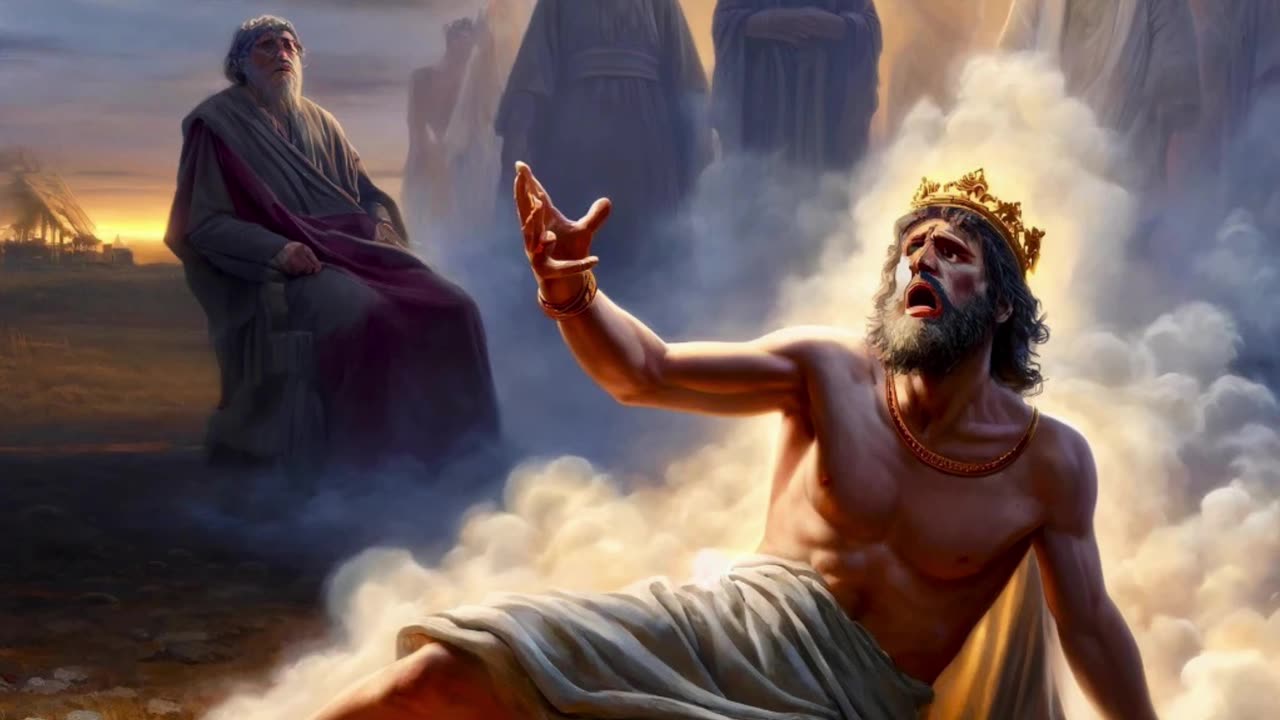Premium Only Content

"1 Samuel 19: The Escape of David and Saul’s Descent"
The Evil Spirit from Yahuah:
The concept of an “evil spirit” sent by Yahuah to torment Saul is intriguing and can be challenging to understand. The idea of Yahuah sending an evil spirit might seem contradictory, but it’s essential to consider the context and broader scriptural understanding.
1. Purpose of the Evil Spirit:
* Judgment and Consequence: In 1 Samuel 16:14, it is noted that the Spirit of Yahuah departed from Saul, and an evil spirit from Yahuah troubled him. This can be seen as a form of divine judgment or consequence for Saul’s disobedience and rejection of Yahuah’s commands. Since Saul repeatedly disobeyed Yahuah, this tormenting spirit may have been sent to exacerbate his already deteriorating mental state as a consequence of his actions.
* Testing and Humiliation: Another interpretation could be that this spirit was allowed to torment Saul to humble him, test him, or drive him to repentance. However, instead of turning back to Yahuah, Saul’s pride and fear pushed him further into darkness.
2. Other Biblical Instances:
* Job: In Job 1:12, Yahuah allows Satan to torment Job, though not directly sending the torment but permitting it within certain boundaries. This shows that Yahuah can allow evil forces to operate under His sovereign control, often for purposes beyond human understanding.
* Ahab: In 1 Kings 22:19-23, Yahuah permits a lying spirit to deceive King Ahab’s prophets, leading to Ahab’s downfall. Here, again, Yahuah allows an evil spirit to fulfill His purposes, demonstrating His ultimate control over all spiritual forces.
Saul Prophesying Naked:
The scene of Saul prophesying naked is one of the more bizarre and symbolic moments in 1 Samuel 19. Prophesying itself was often a physical and ecstatic experience in ancient Israel, but doing so naked adds a layer of meaning.
1. Symbolism of Nakedness:
* Humiliation: Nakedness in the Bible often symbolizes shame, exposure, and humiliation. By stripping off his garments and prophesying naked, Saul is symbolically laid bare before Yahuah and the people. It represents his loss of royal dignity and foreshadows the stripping away of his kingship.
* Divine Control: The fact that Saul is compelled to prophesy in this state by the Spirit of Yahuah shows that despite his attempts to control the situation and maintain power, he is utterly at the mercy of Yahuah’s will.
2. Historical Context:
* In ancient times, prophets often performed symbolic actions to convey Yahuah’s messages. Saul’s nakedness could also signify his vulnerability and the fact that he is no longer covered by Yahuah’s favor, as the Spirit had departed from him.
Jonathan and Michal’s Loyalty to David:
Jonathan and Michal’s actions are significant because they show a stark contrast between their loyalty to David and Saul’s growing animosity toward him.
1. Jonathan’s Love for David:
* Jonathan’s deep bond with David, described as “knit” to his soul, symbolizes a covenantal relationship based on mutual respect and love (1 Samuel 18:1-4). Jonathan sees David as Yahuah’s chosen one and is willing to protect him, even at the expense of his relationship with his father, Saul.
2. Michal’s Protection of David:
* Michal’s love for David also drives her to protect him from her father’s wrath, as seen when she helps David escape (1 Samuel 19:11-17). However, as you noted, her attitude toward David changes later (2 Samuel 6:16), where she despises him for his uninhibited worship of Yahuah. This change could be due to a complex mixture of personal, political, and spiritual reasons, reflecting the strain of her position between her father, her husband, and her own expectations.
Saul’s Humiliation and the Kingdom:
Saul’s decline is marked by his growing paranoia, fear, and jealousy. The constant comparison between Saul and David (1,000 vs. 10,000) exacerbates Saul’s insecurity and drives him further into madness.
1. Saul’s Isolation:
* As Saul becomes increasingly consumed by his fear of David, he isolates himself from his children, his servants, and ultimately from Yahuah. His obsession with maintaining power leads to irrational decisions and actions, further alienating those who once supported him.
2. The Shift in Power:
* The narrative highlights the gradual transfer of Yahuah’s favor from Saul to David, symbolized by David’s victories and growing popularity. Saul’s children’s loyalty to David over their father serves as a powerful symbol of this shift in divine favor and the impending downfall of Saul’s reign.
-

The White House
3 hours agoPress Secretary Karoline Leavitt Briefs Members of the Media, Nov. 12, 2025
1.66K4 -
 1:01:12
1:01:12
Timcast
2 hours agoMAGA Base FURIOUS With Trump Over H1-B Defense
148K92 -
 LIVE
LIVE
Sean Unpaved
1 hour agoJameis Winston To START For Giants vs. Packers! | UNPAVED
94 watching -
 LIVE
LIVE
The Charlie Kirk Show
1 hour agoAmerica for Americans? + Operation Midway Blitz + Berkeley Aftermath | Jobob, McCoy, Schneider
3,824 watching -
 LIVE
LIVE
Side Scrollers Podcast
2 hours agoMario Galaxy Movie Trailer REACTION + Black Lesbian GOES OFF on Weiner + More | Side Scrollers
764 watching -
 15:49
15:49
Rethinking the Dollar
2 hours agoThis Crypto ‘Freeze Code’ Warning Changes Everything
5K3 -
 1:10:03
1:10:03
The Rubin Report
3 hours ago‘The View’s Sunny Hostin Tries to Shame John Fetterman Until He Puts Her in Her Place
109K53 -
 LIVE
LIVE
LFA TV
16 hours agoLIVE & BREAKING NEWS! | WEDNESDAY 11/12/25
2,869 watching -
 18:53
18:53
Professor Nez
2 hours agoDemocrats TURN on Chuck Schumer & BOOT HIM OUT of the Party!
20.9K6 -
 1:36:52
1:36:52
The Mel K Show
2 hours agoMORNINGS WITH MEL K - Dueling Narratives & Endless Distraction: Don’t Lose Focus! - 11-12-25
23.3K5